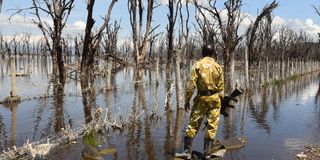Explainer: All you need to know about the illegal fishing in Lake Nakuru and whether the fish is safe to eat

KWS officer looking at a submerged fence at the Lake Nakuru National Park.
On February 27 three people were arrested by the Kenya Wildlife Service (KWS) in Lake Nakuru National Park after they were found in possession of fish suspected to be from Lake Nakuru.
According to Titus Mitau, the deputy director of Lake Nakuru National Park, 450kg of fish packed in 18 crates was seized. They also found 34 empty crates.
The incident elicited mixed reactions from locals, some of whom raised pertinent questions about the legality of fishing in the lake and the never-ending battle between the government and unscrupulous businessmen who continue to play cat and mouse with the law.
To understand what we are talking about, we need to take you back to the year 2020, when the lake burst its banks and overflowed into the neighbouring residential areas, displacing the locals.
Due to the overflow of the lake, fish were introduced into Lake Nakuru after a fish farm uphill spilled fingerlings and mature fish into the River Ndarugu , which feeds into the lake.
As expected, the fish grew and multiplied, making fishing an economic activity for the people of the area.
Over time, fishing in the lake has become an issue leading to conflict between KWS and the locals who entered the lake to fish.
In this explainer, the Deputy Director of Lake Nakuru National Park, Titus Mitau, sheds light on the matter.
He says that according to the Wildlife Act, fishing is not allowed in a national park. However, Mr Mitau insists that fishing is not illegal, what is illegal is fishing inside a national park.
For example, the three people we arrested after receiving a tip-off that the fish they were carrying had come from the lake.
"Yes, it is illegal to fish in Lake Nakuru, in fact the three will also face charges for illegal fishing under the Public Health Act which clearly outlines how one should handle the transportation of fish and also there are these licences of how one should handle and sell fish. The penalty if found guilty is a fine of Sh200,000," said Mr Mitau.
In an interview with the media, Mining and Blue Economy Cabinet Secretary Salim Mvurya confirmed that the fish in Lake Nakuru does indeed contain 32 per cent of the metal arsenic.
According to the World Health Organization (WHO), arsenic is highly toxic and long-term exposure through drinking water or eating food can cause cancer, skin lesions, diabetes and cardiovascular disease.
A study by the Kenya Marine and Fisheries Research Institute (KEMFRI) found that fish from Lake Nakuru also had high levels of nitrates and traces of other highly dangerous chemicals.
Apart from the fact that it is illegal to fish in the national park, the fish from the lake is harmful to anyone who eats it.
